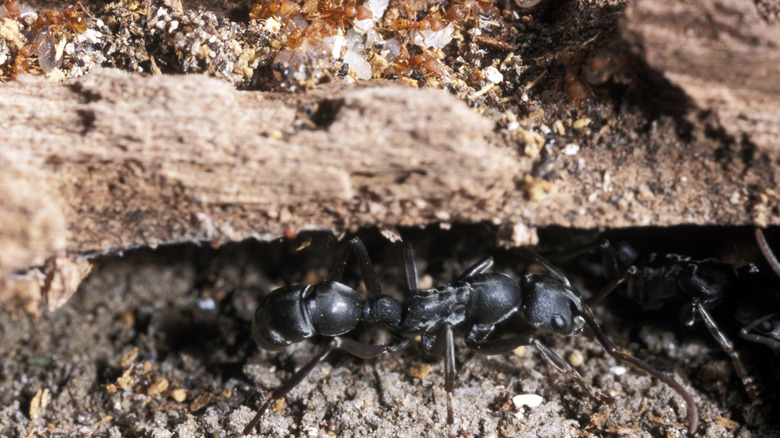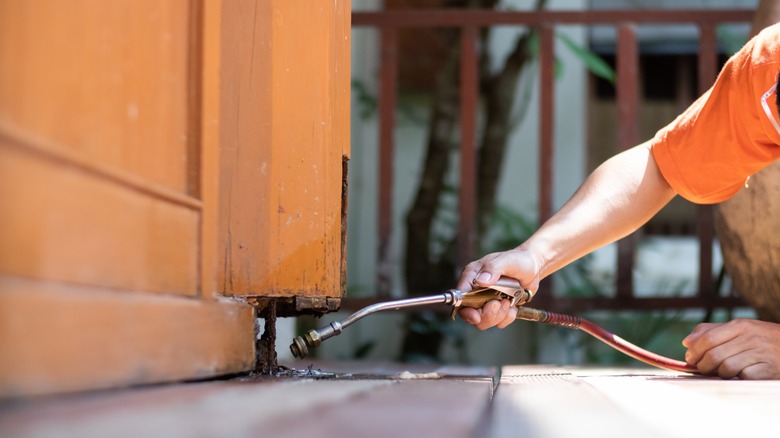The Surefire Way To Wipe Out Termites In A Pinch
Dealing with termites? It's a hassle. You've likely heard about using boric acid to kill them. This stuff has been around for ages, helping folks tackle not just termites but a bunch of other pests. So how does it work? Well, it disturbs the termites' ability to process food. Whether they walk through boric acid or eat it, they can't get the nutrients they need, leading to their eventual starvation. But there's a big "but" here. For boric acid to work its magic effectively, it needs to reach a large number of these critters across the colony. Just targeting a few areas around your home isn't enough. You need broad coverage, especially if you're dealing with a large infestation. And remember, boric acid is toxic if ingested, so it's not something you want to use carelessly, especially around kids and pets.
But let's be clear: Getting rid of termites isn't usually a one-and-done kind of deal. It means really getting to know them — understanding how they live, breed, and build their colonies. It's also about setting up a solid defense, keeping an eye out for signs of them, and sometimes, calling in the pros for backup. These strategies aren't just trivia; with a better understanding of their habits, you can make smarter moves to protect your home. So, while boric acid can be part of your strategy against termites, it's not the whole game — often, it's just the starting point.
The complex world of termites: breeding habits and colony structure
Termites are fascinating, in a way. They aren't your typical household pests; they're super organized and really good at playing hide and seek. They live in complex, structured colonies where each one has a role. There are the workers who are out and about gathering food. There are the soldiers protecting the colony. Then there's the queen who's essentially the heart of the whole operation, laying thousands of eggs to ensure the future of the colony. Their breeding habits are intense. The queen can lay eggs continuously, and with each one, the colony grows stronger and more resilient. This rapid growth makes termites not just a nuisance but a formidable force to reckon with in your home.
And then there's the way they hide. Termites aren't the type to lounge around where you can see them. They prefer the hidden life, creating nests that are out of sight, often underground or deep within the wooden structures of your house. This sneakiness is what makes them particularly challenging to target. You might not even know they're there until they do considerable damage. Because of their secretive nature and the structure of their colonies, reaching them where it hurts isn't straightforward. It's not just about laying down some boric acid and calling it a day. These pests require a more calculated approach using baits, which considers their breeding and hiding habits to effectively disrupt their lifecycle and protect your home from their destructive tendencies.
Integrating boric acid with termite baits for comprehensive control
Mixing boric acid with termite baits is like hitting two birds with one stone. Think of termite baits as the ultimate temptation, pulling these sneaky pests out from where they hide. These baits have a killer ingredient that termites can't resist, but it works slowly, giving them plenty of time to take it back home to the rest of the colony. You'll find baits that go into the ground around your home or others that sit above the ground where you've seen termites hanging out. The idea is to mess with their normal eating and growing routines, putting a stop to their colony's growth. Adding boric acid to the mix steps up your game. Spraying boric acid around entry points or where termites feed acts like a first defense line — it either kills the termites on contact or makes them want to stay away. While you're doing that, the bait stations are busy attracting and taking out the rest of the termite crew, even the ones that didn't get a direct hit from the boric acid.
But here's the real talk: Handling termites on your own might not always cut it. If you're dealing with a big infestation or if your first try doesn't knock them out, it might be time to hire a pest control expert. They have the heavy-duty stuff — stronger treatments and gear that can go where DIY options can't.


